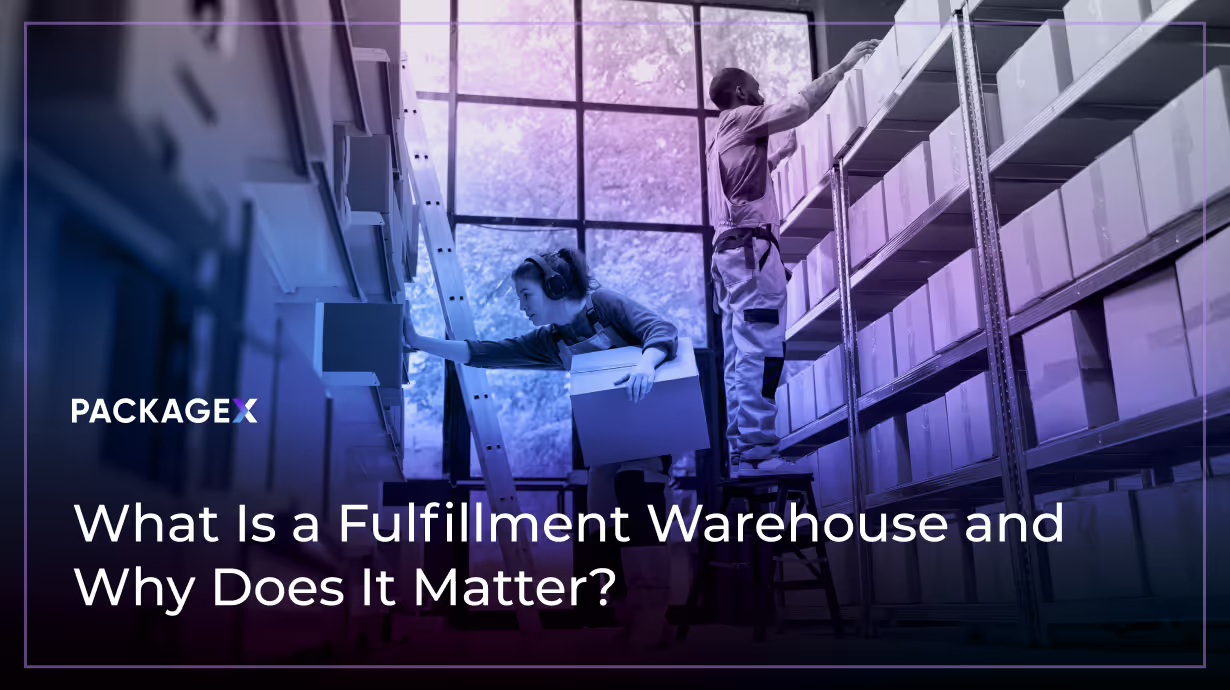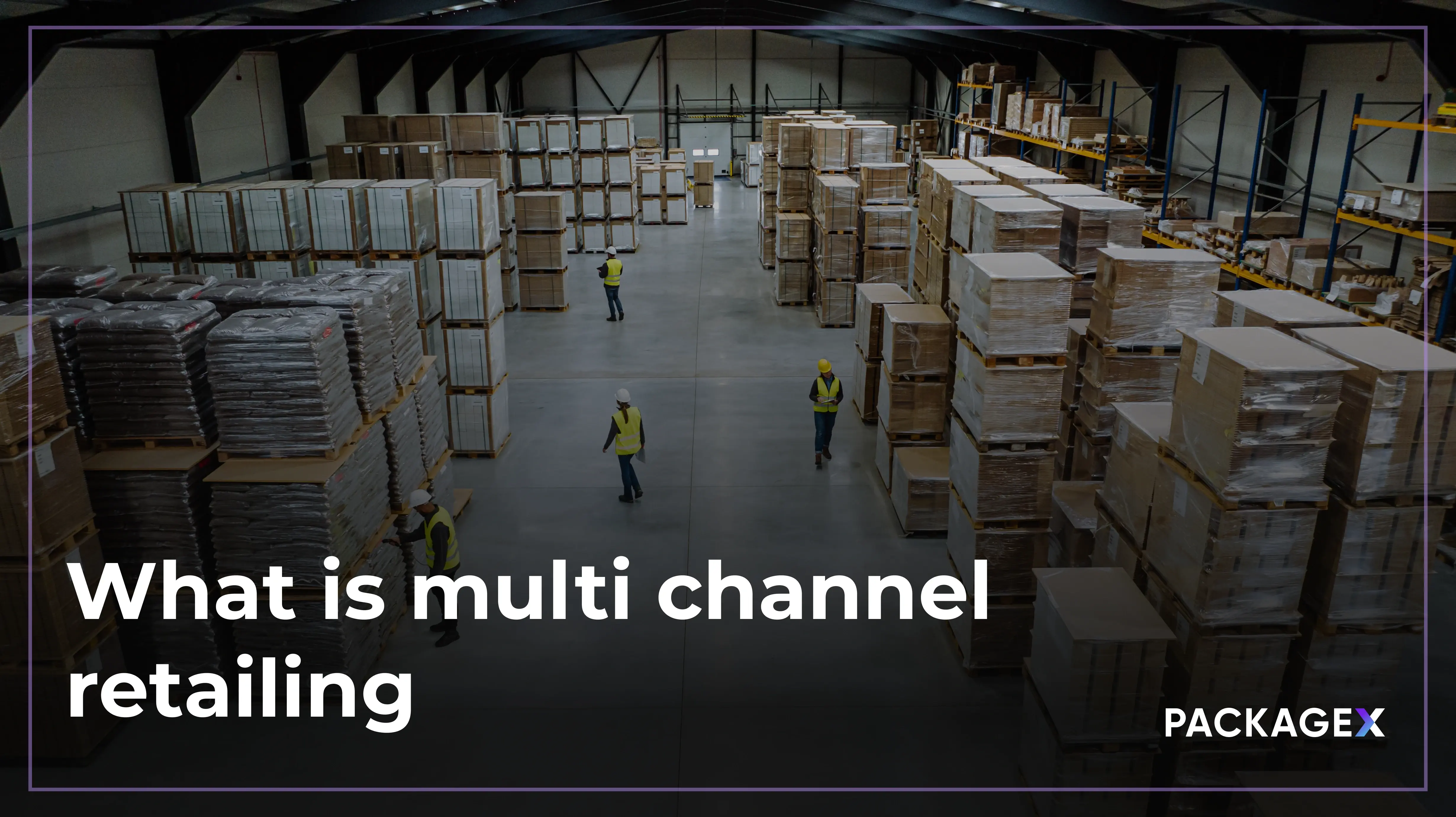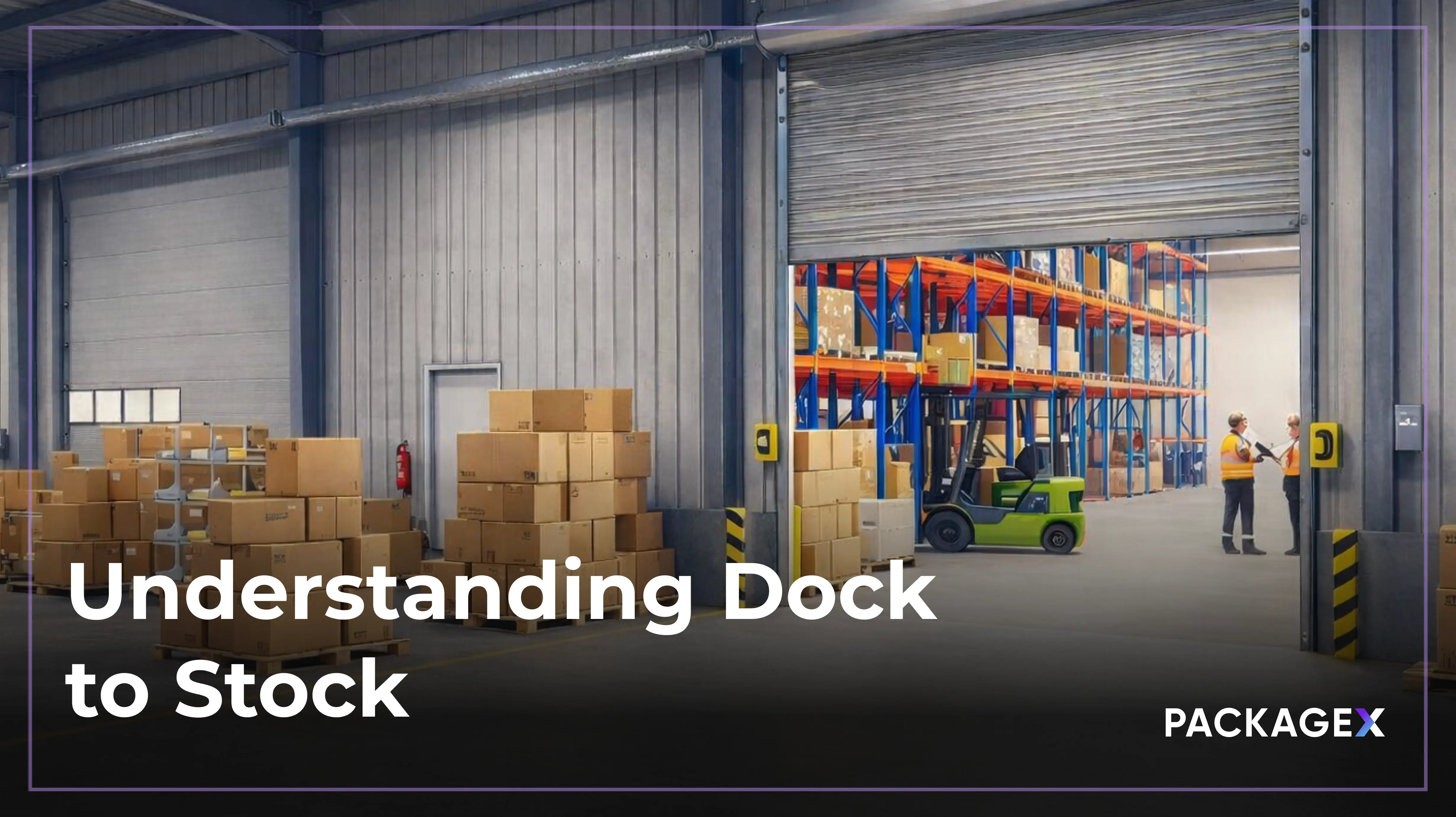According to industry reports, global e-commerce sales are projected to reach $8.1 trillion by 2026. These stats highlight the unprecedented demand for efficient logistics solutions. Businesses today must manage rising order volumes. While meeting customer expectations for faster and more accurate deliveries.
A fulfillment warehouse plays a critical role in this process. Unlike traditional storage facilities, an order fulfillment warehouse is designed to handle the complete cycle. That includes receiving, storing, picking, packing, and shipping products. This model enables companies to streamline inventory management and accelerate last-mile delivery.
Outsourcing warehouse fulfillment operations can cut logistics costs and improve delivery speed by up to 30%. For e-commerce businesses, this translates into higher customer satisfaction, reduced operational complexity, and the ability to scale more effectively.
This blog will explain what a fulfillment warehouse is and how it differs from other warehouse types. We’ll explore how fulfillment warehouses work, their benefits, and how technology is transforming the industry.
What is a Warehouse?
A warehouse is a facility built to store inventory, raw materials, or finished goods. It holds them until they are needed for production, distribution, or sale. It is central to warehousing and distribution. It enables order fulfillment, inventory management, and efficient warehouse operations. Due to this, the supply chains keep moving smoothly, from manufacturers to businesses and customers.
Types of Warehouses
Warehouses serve different purposes in supply chains and e-commerce. Some are made for long-term storage. Others are designed for quick warehouse management and order processing.
Some of them are explained below:
Traditional Warehouses
Traditional warehouses are used for bulk storage. For storing goods, raw materials, or finished products for longer periods. They focus on safe storage and inventory management rather than expedited shipping.
Distribution Centers
Distribution centers are designed for speed and efficiency. They are often located near transportation hubs. They move products quickly from suppliers to retailers or customers. These facilities support large-scale warehouse fulfillment. Also plays a critical role for businesses that rely on fast distribution.
Fulfillment Warehouses
A fulfillment warehouse manages the complete warehouse order fulfillment process. This includes picking, packing, and shipping goods to customers. They are especially important for e-commerce and dropshipping companies. That mostly depends on fast and reliable delivery.
Cross-Docking Warehouses
Cross-docking warehouses reduce storage time by moving goods directly from inbound shipments to outbound trucks. This model supports just-in-time distribution and keeps warehouse operations lean and cost-effective.
Smart Warehouses
Smart warehouses use AI and automation to improve inventory tracking and warehouse fulfillment. They help businesses scale operations, minimize errors, and keep up with customer demands for faster order processing and delivery.
What is a Fulfillment Warehouse?
The e-commerce and retail industry is becoming increasingly competitive. This requires businesses to adopt efficient logistics solutions to meet rising customer expectations.
A fulfillment warehouse is also called an order fulfillment center. A fulfillment warehouse is a facility designed to store, manage, and ship online orders. Products are received, organized, picked, packed, and delivered from this location. It is a key part of the warehouse fulfillment process. It ensures smooth warehouse order fulfillment for e-commerce businesses.
How a Fulfillment Warehouse Differs from a Traditional Warehouse?
A traditional warehouse is primarily used to store goods for long periods. These facilities focus on holding inventory and moving large shipments, with little order processing and no direct customer interaction.
While a fulfillment warehouse handles the full warehouse order fulfillment process. A warehouse fulfillment center is designed for speed and accuracy, offering warehouse and fulfillment services that help businesses deliver orders quickly.
Research shows that businesses using fulfillment centers can cut order processing times by up to 50%. The outcome of this is higher customer satisfaction and repeat purchases.
Companies like Amazon have set new standards in e-commerce. Amazon implements fulfillment warehouses in key locations to enable same-day and next-day deliveries.
By using warehouse fulfillment centers in logistics operations, businesses can grow efficiently.
Key Services Provided by Fulfillment Warehouses
Fulfillment warehouses play a crucial role in modern supply chains. Fulfillment warehouses offer comprehensive services that help businesses efficiently manage warehouse operations.
The following are some key functions of a fulfillment warehouse:
1. Inventory Management:
Accurate inventory management is critical for businesses aiming to avoid stockouts or overstocking. Advanced warehouse fulfillment services use real-time tracking systems and barcode scanning. They rely on AI-driven analytics to keep stock levels balanced.
Companies that use automated inventory management solutions see fewer stock discrepancies. They can reduce errors by up to 30%.
2. Order Processing: Picking, Packing, and Accuracy
A well-structured order fulfillment warehouse boosts efficiency in order processing. This setup minimizes errors and speeds up delivery. Robotics, AI sorting systems, and smart inventory placement optimize the pick and pack fulfillment. Since 69% of customers might not shop again after receiving an incorrect order. For this very reason, fulfillment centers focus on accuracy to improve customer satisfaction.
3. Shipping and Handling:
Shipping is a significant factor in customer experience. Modern warehousing and fulfillment services integrate with multiple carriers. That allows businesses to choose cost-effective and expedited shipping options. By using AI-driven route optimization and demand forecasting, fulfillment warehouses can reduce delivery times by 20–30%.
4. Returns Management:
Return rates in e-commerce average around 20%, so an efficient returns process is essential. Fulfillment warehouses streamline reverse logistics efficiently. Fulfillment warehouses offer pre-labeled return solutions, automated refund processing, and restocking strategies. That helps in reducing financial losses.
The Key Benefits of a Fulfillment Warehouse
In the e-commerce industry, businesses must optimize logistics to stay ahead of the competition. Fulfillment warehouses play a crucial role in ensuring smooth operations.
Here’s why businesses increasingly turn to e-commerce fulfillment warehouses to enhance their supply chain efficiency.
1. Scalability for Businesses
Online sales often rise and fall with seasons, product launches, or market shifts. A fulfillment warehouse gives businesses the flexibility to scale operations without investing in new storage space, technology, or staff. This adaptability ensures smooth warehouse fulfillment, even during peak demand.
2. Cost Savings
Running an in-house warehouse is expensive, with costs for rent, equipment, and labor. By using warehouse fulfillment services, businesses share storage and logistics resources, which lowers expenses. Many fulfillment centers also secure discounted shipping rates. This helps companies to save more and reinvest in growth.
3. Faster Deliveries
Customers nowadays expect fast deliveries. This is why many are choosing brands that offer same-day or two-day shipping. An e-commerce fulfillment warehouse located near key markets helps reduce delivery times. This improves warehouse order fulfillment efficiency and speed. The outcome leads to higher conversion rates, repeat purchases, and stronger customer loyalty.
4. Improved Inventory Management
Fulfillment warehouses use advanced warehouse fulfillment software to track, organize, and manage stock in real time. This reduces the risk of overstocking or stockouts and ensures accurate order processing. With better visibility, businesses can optimize supply chain management. This will help them to meet customer demand more effectively.
5. Focus on Core Business Activities
Outsourcing warehouse fulfillment frees up time and resources for what matters most. Businesses can concentrate on marketing and customer engagement while leaving warehouse order fulfillment and logistics to experts. This focus drives growth and keeps operations more efficient.
Technological Advancements in Fulfillment Warehousing
Technology is evolving the fulfillment warehouse industry. It makes operations faster, more accurate, and easier to scale. As e-commerce grows, businesses must use innovative solutions to meet rising consumer demands.
Warehouse Fulfillment Software
A major innovation in modern fulfillment is warehouse fulfillment software. It supports businesses by:
- Automating inventory tracking and order processing
- Coordinating shipping and reducing manual work
- Connecting directly with e-commerce platforms
- Offering real-time visibility into stock levels
- Improving accuracy, which reduces costly returns
By using this technology, businesses improve warehouse order fulfillment.
AI and Robotics in Warehousing
Beyond software, automation is transforming warehouse fulfillment services. Key technologies include:
- Autonomous Mobile Robots (AMRs): Speed up picking and packing
- AI-powered sorting systems: Optimize efficiency in busy warehouses
- Robotic arms and conveyors: Streamline order handling and shipping
Investing in these warehouse solutions helps businesses scale effortlessly while cutting costs.
Choosing the Right Fulfillment Partner
Selecting the right fulfillment partner can enhance your supply chain efficiency. Businesses must consider several factors before committing to a third-party logistics fulfillment warehouse:
- Location: A strategically placed 3PL fulfillment warehouse reduces shipping costs and speeds delivery. Studies show that 73% of consumers expect affordable, fast shipping.
- Technology: Advanced warehouse fulfillment software enhances inventory tracking, order accuracy, and automation.
- Scalability: A reliable fulfillment provider should support business growth without bottlenecks.
Working with a third-party logistics fulfillment warehouse can cut costs and boost expertise. It also gives access to global shipping networks. Notably, 86% of companies report quicker order processing after outsourcing logistics. The right fulfillment partner can truly transform operations.
PackageX: Revolutionizing Fulfillment with Smart Logistics
PackageX is revolutionizing warehouse fulfillment services in the fast-paced logistics field by using AI and automation. Unlike traditional providers, PackageX integrates AI-powered warehouse fulfillment software to streamline operations.
Here’s how PackageX enhances fulfillment:
- AI-Driven Efficiency: Automation reduces errors and speeds up processing.
- Seamless Integration: Compatible with e-commerce platforms and order fulfillment warehouse systems.
- Scalability & Visibility: Real-time tracking ensures transparency across the supply chain.
PackageX improves warehouse and fulfillment efficiency by using AI solutions. PackageX solutions help businesses optimize fulfillment operations, enhance order accuracy, and improve last-mile delivery efficiency.
Making the right choice is essential for warehouse efficiency. And this is why PackageX is your ideal option.
FAQs
What is the fulfillment process?
The fulfillment process includes receiving inventory, storing products, picking and packing orders, and shipping them to recipients. Efficient warehouse fulfillment services ensure timely and accurate order processing, enhancing customer satisfaction.
What are fulfillment services?
Fulfillment services cover end-to-end order management, which includes inventory storage, order picking, packing, shipping, and returns processing. Businesses use warehousing and fulfillment services to streamline logistics and improve delivery efficiency.
What is the difference between a warehouse and a fulfillment center?
A warehouse is mainly used for long-term storage of bulk goods, raw materials, or finished products. A fulfillment center, often called a fulfillment warehouse, goes beyond storage to manage warehouse order fulfillment. It handles receiving, picking, packing, and shipping, making it essential for eCommerce businesses that need fast warehouse fulfillment services.
What is an example of a fulfillment center?
A well-known example of a fulfillment warehouse is Amazon’s e-commerce fulfillment center. These large facilities act as warehouse fulfillment centers where products are stored, processed, and shipped directly to customers. With advanced warehouse fulfillment software and automation, they ensure accurate and expedited order fulfillment on a massive scale.
What does a fulfillment company do?
A fulfillment company manages the complete warehouse order fulfillment process for businesses. It handles receiving goods, storing inventory, picking and packing, shipping, and even returns. By using warehouse fulfillment services, businesses save time and costs while ensuring accurate and timely deliveries.
What is a fulfillment company?
A fulfillment company, often linked to a fulfillment warehouse, is a third-party provider that offers end-to-end warehouse fulfillment services. It allows businesses to outsource storage, order processing, and shipping, ensuring smooth warehouse fulfillment and giving companies more time to focus on growth.



.webp)
